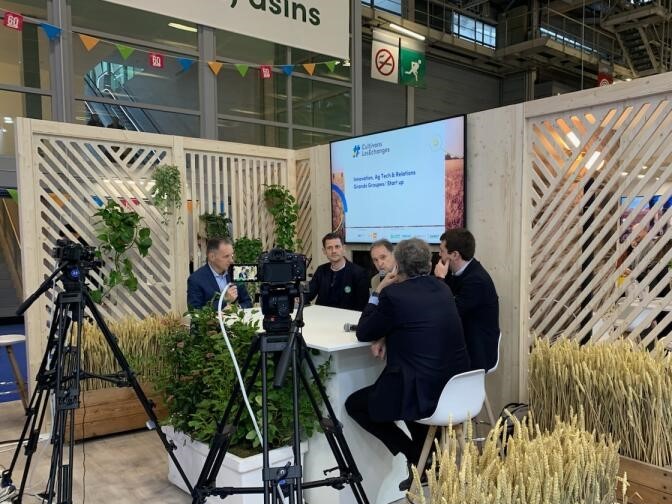For the 60th edition of the Paris International Agricultural Show which took place from February 24 to March 3, the InVivo group, in collaboration with Terre-net, hosted a TV show called ‘Cultivons les Échanges’ (Cultivating Interaction, in English). The week’s 31 round-tables, broadcast live on their website and social networks, addressed all issues facing the world of agriculture, particularly from an industry perspective.
As a key player in agricultural innovation, our CEO Jean-François Déchant was invited alongside Thierry Blandinières, CEO of InVivo, Jérôme Le Roy, CEO of Ferme Digitale and Weenat, and Félix Bonduelle, CEO & Co-Founder of Javelot, to take part in discussions at the conference entitled ‘Innovation, AgTech & Start-Up-Major Group Relations’.
Major groups and start-ups: what role can each play in adopting innovation?
It is widely accepted that agriculture needs to evolve in order to adapt to the hazards of climate change and to the expectations of society and regulations. Thierry Blandinières is convinced of this need: “We cannot afford to miss out on innovation and stay within the realms of ‘conventional’ agriculture. As a major player in the sector, we absolutely had to make a move.”
This observation was shared by all three speakers attending to support the start-ups’ point of view, and particularly by Jean-François Déchant, who began his speech with a definition: “What is innovation? It’s a crazy gamble, an offbeat vision, a projection into the future, and also a great deal of risk.
“Innovation is precisely what a start-up brings to its ecosystem, but it cannot succeed alone,” Déchant went on to add. “Once an innovation has reached a certain level of maturity, it is up to major groups to encourage adoption.”
Here, too, all the speakers agreed: “By their very nature, major groups, cooperatives and wholesalers are our customers, so it’s obvious that they are essential,” explained Félix Bonduelle. “We need to gain the trust of major groups, because that’s what will enable us to become a French, then European, and even international champion.
Major groups are also influencers, and as Jérôme Le Roy reminded us: “Adoption is the key. Major groups help us get our message across to the general public and future users, thanks to their presence in the field and their contacts, both elements we don’t have when setting up a start-up.”
Jean-François Déchant stressed the importance of partnerships between start-ups and agricultural retailers:


